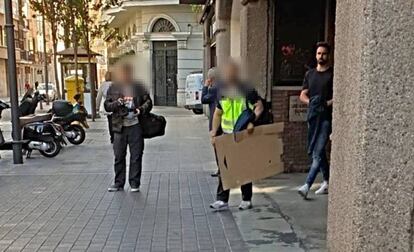Spanish soccer players held for match-fixing in top divisions
Police arrest nearly a dozen people, including the alleged ringeader Raúl Bravo, a former Real Madrid footballer who also played on the national team

Around a dozen arrests were made in Spain on Tuesday as part of a probe into an alleged match-fixing network in Spanish soccer. Among those detained are the former Real Madrid and Spanish national team player Raúl Bravo, suspected of being the ringleader of the criminal association, as well as the chairman of the Huesca soccer club, Agustín Lasaosa. A second-division match between that team and Club Gimnàstic de Tarragona – known as Nàstic – was the origin of the probe.
Another one of the games under investigation was played between Valladolid and Valencia on the last day of this season, and saw Valencia qualify for the Champions League. Strange bets placed by at least one of the players from Valladolid aroused suspicions. Sources close to the investigation stressed that Valencia players and the team itself are not in any way under investigation.
Among those arrested is Borja Fernández, a Valladolid player who retired from professional play after the game against Valencia. He was the captain at that match and spent 84 minutes on the pitch.
¡¡¡Detenido!!! Así conducen agentes de la Policía Nacional a Borja Fernández, recién retirado del Real Valladolid, dentro de una operación contra el amaño de partidos pic.twitter.com/jLV4fJX0ga
— Onda Cero Valladolid (@ocvalladolid) May 28, 2019
A tweet from the Onda Cero radio network: “Arrested!!! National Police officers take away Borja Fernández, who just retired from Real Valladolid, in a raid against match-fixing.”
The other detainees include Carlos Aranda, who has played for a number of teams in LaLiga, Spain’s top division; Íñigo López Montaña, from Deportivo de La Coruña and a former player at Huesca; and Juan Carlos Galindo Lanuza, the head of medical services at Huesca.
The police carried out nine searches in Huesca, Madrid, Valladolid, Málaga and A Coruña, although the main focus of the probe is in the first of those cities. A large number of police officers descended on the headquarters of the Sociedad Deportiva Huesca club first thing on Tuesday morning.
The lawyer for the club, however, insisted that there was “calm” as well as “uncertainty about what could happen.” “There are no concerns at the club and we are at the disposal of the courts for whatever they request from us,” he added.
The suspects in the case are accused of reaching deals to fix a total of three games
The suspects in the case are accused of reaching deals to fix a total of three games, in the Primera, Segunda and Tercera divisions. According to police sources, “the Third Division game was unsuccessful, prompting the players involved to “compensate their losses” with another fix.
The Huesca-Nàstic game that originally aroused suspicion was played on May 27, 2018. During the game, betting was suspended at 30 of the 57 biggest gaming services after irregular patterns were detected. Bets that were 14 times bigger than the norm for this category of soccer match were being placed on a 0-0 score line at half time and a victory for the visiting team. Both predictions came true. At the time, Nàstic was fighting to avoid being relegated, and was 29 points short of Huesca in the league. The latter team, meanwhile, had been promoted to the Primera on its previous matchday.
According to police sources, the match rigging consisted of a number of stages. First, the network would choose the games – preferably being played at the beginning or end of the season. The agreed bets were combined, meaning that they did not just involve the final score but also other elements of the game – corners, fouls, cards… – “in order to notably increase the margins of the winnings.” Then someone from the teams in question would be approached, preferably the captain. Once the fix was agreed, cash payments would be made before and after the game.
All of the people arrested today are accused of criminal association, corruption and money laundering. The police have been assisted by La Liga, Europol and the Spanish state gambling regulator, the DGOJ.
English version by Simon Hunter.
Tu suscripción se está usando en otro dispositivo
¿Quieres añadir otro usuario a tu suscripción?
Si continúas leyendo en este dispositivo, no se podrá leer en el otro.
FlechaTu suscripción se está usando en otro dispositivo y solo puedes acceder a EL PAÍS desde un dispositivo a la vez.
Si quieres compartir tu cuenta, cambia tu suscripción a la modalidad Premium, así podrás añadir otro usuario. Cada uno accederá con su propia cuenta de email, lo que os permitirá personalizar vuestra experiencia en EL PAÍS.
¿Tienes una suscripción de empresa? Accede aquí para contratar más cuentas.
En el caso de no saber quién está usando tu cuenta, te recomendamos cambiar tu contraseña aquí.
Si decides continuar compartiendo tu cuenta, este mensaje se mostrará en tu dispositivo y en el de la otra persona que está usando tu cuenta de forma indefinida, afectando a tu experiencia de lectura. Puedes consultar aquí los términos y condiciones de la suscripción digital.








































